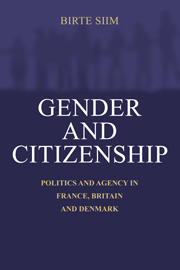Book contents
- Frontmatter
- Contents
- List of Tables and Figures
- Preface
- Abbreviations
- Introduction: Feminist Rethinking of Citizenship
- 1 Towards a Gender-sensitive Framework of Citizenship
- 2 Theories about Citizenship
- 3 Feminist Approaches to Citizenship
- 4 Gender and Citizenship: The French Case
- 5 Gender and Citizenship: The British Case
- 6 Gender and Citizenship: The Danish Case
- Conclusion: Towards a Contextualised Feminist Theory of Citizenship
- Appendix
- Notes
- Bibliography
- Index
6 - Gender and Citizenship: The Danish Case
Published online by Cambridge University Press: 05 November 2011
- Frontmatter
- Contents
- List of Tables and Figures
- Preface
- Abbreviations
- Introduction: Feminist Rethinking of Citizenship
- 1 Towards a Gender-sensitive Framework of Citizenship
- 2 Theories about Citizenship
- 3 Feminist Approaches to Citizenship
- 4 Gender and Citizenship: The French Case
- 5 Gender and Citizenship: The British Case
- 6 Gender and Citizenship: The Danish Case
- Conclusion: Towards a Contextualised Feminist Theory of Citizenship
- Appendix
- Notes
- Bibliography
- Index
Summary
Assumptions about Gender in Danish Political Culture
In this chapter I analyse the discourse and politics of gender and citizenship in Denmark. I trace the development of the welfare state and democracy between 1915 and 1995, looking at the dynamic, meaning and implications of shifts in the interplay of gender and citizenship. The focus is on three crucial issues: democratic citizenship and the role of women's agency; the formation of the universal welfare state and the subsequent shift towards a dual-breadwinner norm; and women's inclusion in democratic citizenship during the last thirty years. The emphasis is on understanding the shifts in the discourse and politics of gender and citizenship and on the role of women's agency. The research interest is to understand the political meaning of gender in contemporary debates about citizenship.
In relation to the active/passive demension, I look at the discouse about gender and the role of women's organisations in the development of democracy and soicial policy. In relation to the public/private demension, I look at the discourse about women's wage work and the organisation of care work in the public and the private sector.
The Scandinavian democracies have important commonalties compared with the dominant Anglo-American political culture. They are fotern portrayed as small, homogneeous and peaceful democracies governed by the political ideas of social democracy, which include ‘a passion for equality’ (Alestahlo and Kuhnle 1987).
- Type
- Chapter
- Information
- Gender and CitizenshipPolitics and Agency in France, Britain and Denmark, pp. 108 - 148Publisher: Cambridge University PressPrint publication year: 2000



